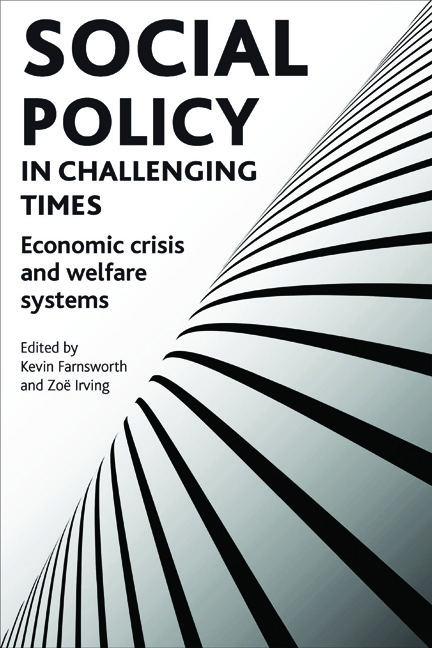Book contents
- Frontmatter
- Contents
- List of figures and tables
- Notes on contributors
- Acknowledgements
- one Varieties of crisis
- two The economic crisis and paradigm change
- three From financial crisis to fiscal crisis
- four Credit crunch, inequality and social policy
- five Global social policy responses to the economic crisis
- six Poverty, the crisis and social policy responses developing countries in developing countries
- seven South Korea after the 1997 economic crisis: a ‘paradigm shift’?
- eight China's response to crisis: what role for social policy?
- nine Tiptoeing through crisis? Re-evaluating the German social model in light of the global recession
- ten Ireland and the impact of the economic crisis: upholding the dominant policy paradigm
- eleven Waving not drowning: Iceland, kreppan and alternative social policy futures
- twelve Experiences from two financial crises in the Nordic welfare states: 1990-93 and 2008-10 compared
- thirteen Social policy and the recent economic crisis in Canada and the United States
- fourteen From economic crisis to a new age of austerity: the UK
- fifteen Responding to the challenges: some concluding remarks on welfare futures in changed circumstances
- Bibliography
- Index
thirteen - Social policy and the recent economic crisis in Canada and the United States
Published online by Cambridge University Press: 07 September 2022
- Frontmatter
- Contents
- List of figures and tables
- Notes on contributors
- Acknowledgements
- one Varieties of crisis
- two The economic crisis and paradigm change
- three From financial crisis to fiscal crisis
- four Credit crunch, inequality and social policy
- five Global social policy responses to the economic crisis
- six Poverty, the crisis and social policy responses developing countries in developing countries
- seven South Korea after the 1997 economic crisis: a ‘paradigm shift’?
- eight China's response to crisis: what role for social policy?
- nine Tiptoeing through crisis? Re-evaluating the German social model in light of the global recession
- ten Ireland and the impact of the economic crisis: upholding the dominant policy paradigm
- eleven Waving not drowning: Iceland, kreppan and alternative social policy futures
- twelve Experiences from two financial crises in the Nordic welfare states: 1990-93 and 2008-10 compared
- thirteen Social policy and the recent economic crisis in Canada and the United States
- fourteen From economic crisis to a new age of austerity: the UK
- fifteen Responding to the challenges: some concluding remarks on welfare futures in changed circumstances
- Bibliography
- Index
Summary
Introduction
The economic crisis that manifested itself in 2008 in the United States (US) also had serious consequences in Canada, a country that has strong economic ties with its powerful southern neighbour. From a social policy standpoint, these countries also have a lot in common in as much as both are considered to be liberal welfare regimes featuring limited public support in at least some policy areas, with an extensive role for private benefits (Esping-Andersen, 1990). One consequence of the gaps in public coverage in policy areas such as unemployment and social assistance benefits is that both the Canadian and the US social welfare safety nets are ill-prepared to alleviate the social suffering stemming from economic hard times. On the other hand, there are important differences between the natures of the social policy systems in the two countries. Furthermore, the impact of the recent economic crisis differed in the two countries in terms of the severity of the recession, the political consequences and the public policy responses.
Two differences between Canada and the US are especially striking. First, the Canadian welfare regime features universal social programmes that simply do not exist in the US, a country characterised by a strict dichotomy between social assistance and social insurance (Fraser and Gordon, 1992). Simply speaking, in Canada, there is a commitment to social citizenship and redistribution that is not as widely present in the US (Myles, 1998; Rice and Prince, 2000). Second, the recent recession did not affect these two countries in the same way. In part because of its better-regulated banking and housing sectors, Canada experienced a significantly milder economic crisis than the US, a situation that has had direct policy consequences. This chapter explores the politics of social policy reform in Canada and the US during the recent economic crisis in order to provide a better understanding of how, if at all, the crisis disrupted prevailing patterns of social policy development in the two countries.
The chapter starts by discussing the impact of the economic crisis on US politics and society before briefly assessing recent policy trends in the fields of unemployment benefits, Food Stamps, healthcare and old-age pensions. Next, looking at Canada we discuss the nature and the political and social impact of the economic crisis.
- Type
- Chapter
- Information
- Social Policy in Challenging TimesEconomic Crisis and Welfare Systems, pp. 231 - 250Publisher: Bristol University PressPrint publication year: 2011
- 1
- Cited by

